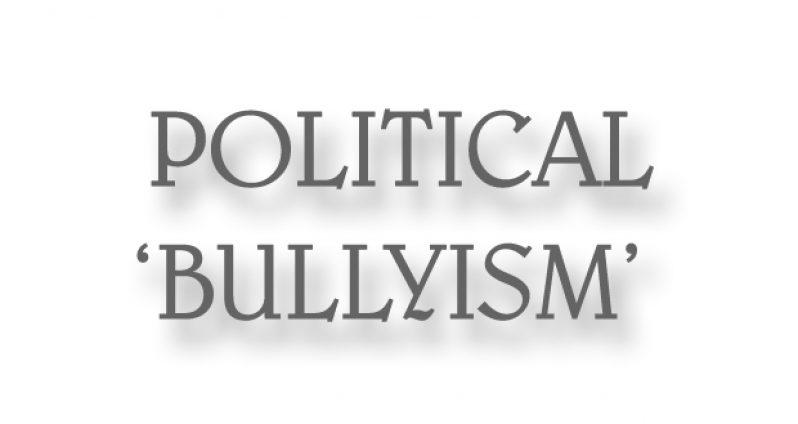A TRIO OF foreign diplomats accredited to Guyana seem inclined to make of this Caribbean Community partner state a victim of the old African proverb that ‘when the elephants fight, it’s the grass that gets trampled…”

In this particular case the “elephants” are, one side, the USA and its NATO (North Atlantic Treaty Organisation) allies, with Russia on the other side. At stake (as the ‘grass’), is the sovereignty and territorial integrity of Ukraine –formerly a member state of the disappeared 20th century Union of the Soviet Socialist Republics—USSR.
However, without getting involved in the historical details of the current bloody military conflicts within Ukraine—where, reportedly, Russian-backed Ukranians, with strong links to Russia, have been engaged in fierce battles

against forces of the central government for territorial autonomy.
Rather, the focus is primarily directed on a perceived faux pas involving a trio of western diplomats And it is destined to be an issue for discussion next week in New York during a meeting of CARICOM’s Council of Foreign Ministers (COFOR). The meeting is scheduled for September 25, when other matters of regional and international importance to the 15-member Community would be addressed.
Traditionally, as widely known, foreign diplomats accredited to an independent

nation normally engage its government via established official channels, either through written or oral communication and at scheduled meetings. Rarely do they opt to address their concerns publicly –whatever the issue—without first having recourse to what’s otherwise viewed as so-called “private diplomacy”
Well, last week a trio of diplomats from the United Kingdom (High Commissioner Andrew Ayre); Canada’s High Commissioner (Dr Nicole Giles) and the USA’s Charge d’Affaires (Bryan Hunte—in the absence of a new ambassador), chose to go public via a press conference to–of all things–call on the Guyana Government of President Donald Ramotar to condemn Russia’s actions against Ukraine. In other words, to take side in a raging dispute that also involves the territorial security of Russia.
This most surprising route by the diplomats to telegraph their divisive “message” was like waving a red flag to the government and people of Guyana. It is a country that has been independent since 1966—like Barbados–and is a founding member of CARICOM with which it is also involved in coordination of foreign policy issues.
Far too provocative
That development was too unnecessarily provocative for Guyana’s Foreign Minister, Carolyn Rodriques , and she was ready to telegraph a response by offering a bit of advice to the trio of offending diplomats.
“The conduct of diplomacy is ever changing, especially with the advancement of technology”, she told the local media, adding: “Yet it is somewhat unusual for Ambassadors and High Commissioners based in Guyana to make a demarche on the host government through a media conference, especially when there is easy access to the relevant authorities….”
Rodrigues, who also happens to be the current chairperson of CARICOM’s Council of Foreign Ministers, bemoaned what she considers “unwarranted and unnecessary diplomatic pressure” on the Guyana Government by foreign diplomats who would otherwise have been aware of Guyana’s position at varying regional/hemispheric fora, with its foreign policy objectives that are rooted in the promotion of peace via dialogue, and firm opposition to settlement of disputes by resort to violence and military conflicts.
Of particular surprise for this columnist is that a credited High Commissioner of Canada should have been involved in the “demarche on the host government”—as referenced by Foreign Minister Rodrigues–given the remarkable reputation sustained over many years by changing Canadian diplomats to CARICOM countries to avoid public controversies—a common feature for American diplomats.
By this past weekend , the Russian Embassy in Guyana felt constrained to issue a media statement through its Press Attache, Denis Kopyl, in which he declared that “it is hard to understand what the latest sanctions by the European Union and America against Russia are about…especially after President Vladimir Putin’s proposed seven-point plan that became the basis of (prevailing) peace agreements….”
+LATEST: Well, with the latest development—following submission of this analysis for publication in today’s edition of the ‘Chronicle”—the trio of foreign envoys to Guyana may well have the proverbial ‘egg-on-the-face’ experience. It relates to the historic agreement on Tuesday of a “peace” accord involving Ukraine and so-called “rebel fighters” involved in an armed struggle for “ territorial autonomy” that also recognizes Russia’s concerns of its own sovereignty and territorial integrity .
(Analysis by Rickey Singh)




.png)









